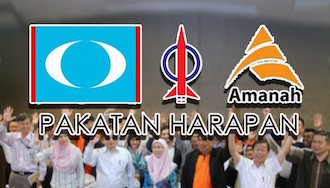Pakatan Harapan all geared up to challenge BN? Really?
Can the new Pakatan Harapan opposition pact form a better government and rid the nation of negative ills that they claim plague the present ruling Barisan Nasional (BN) coalition?
The answer is nobody knows.
Three opposition parties are poised to give the ruling coalition a strong challenge in the next election, following a signed agreement to formalise Pakatan Harapan (PH).
However, PH faces a steep uphill battle to convince voters that it can be a viable alternative in the next polls.
When PH was first announced last September, the public was sceptical as previous opposition coalitions have tended not to last.
The Alternative Front or Barisan Alternatif set up in 1999, split in 2004, and Pakatan Rakyat (PR), formed in 2008, broke up last year after its component Islamic party, PAS, insisted on implementing hudud in Kelantan.
“There’s great scepticism among the public over PH, on whether individual parties can maintain support bases. People are just not certain whether this alliance will be more stable than the previous PR,” said Keith Leong, a research manager with KRA Group.
To avoid the same fate, sparked by damaging internal squabbles which broke up the previous opposition alliance, a code of conduct was signed on Jan 9 involving Anwar Ibrahim’s Parti Keadilan Rakyat (PKR), the Chinese-based Democratic Action Party (DAP) and Parti Amanah Negara (PAN), the Pan-Malaysian Islamic Party (PAS) splinter group.
The agreement contains a code to resolve conflicts within the bloc, outlines the coalition’s principles and how component parties should go about making decisions, for example seat allocations in general elections.
There is also a clause on expulsion should any party go against the agreement.
“Let’s hope we will win in the next election so that we can free the people and free Anwar,” said PKR president Dr Wan Azizah Wan Ismail.
Analysts argued that the agreement does not go the distance to tackle fundamental ideological issues which plagued previous opposition alliances.
The DAP led by Penang Chief Minister Lim Guan Eng is essentially fighting for an equitable Malaysia regardless of race and religion, while PAN, made up of former PAS leaders, still hold allegiance to an Islamic state.
Speaking after the signing ceremony, component parties appeared undecided on how to deal with PAS.
“PAS stated their stance in that they will not work with PH. So, end of story,” said DAP secretary general Lim Guan Eng.
The departure of PAS has left a huge gap in support for the opposition among rural Malays.
Although members of PAN were former PAS leaders, their support in the Malay heartland has been largely untested. However, its president Mohamad Sabu is confident of the party’s chances, who said the party would gain enough support to topple PAS and even BN.
With the next election due in 2018, PH has its work cut out to get its own house in order to present itself as a viable alternative to BN, a coalition that has been in power for almost six decades.
Analyst argued that it needs to find a way to work with PAS, which together with PKR and DAP still form the opposition-controlled state government in Selangor.
PAS president Abdul Hadi Awang has described PAN as a “party of traitors” and has threatened to field candidates in every single seat that PAN plans to contest, which is bound to split votes for the opposition in the next general election.


